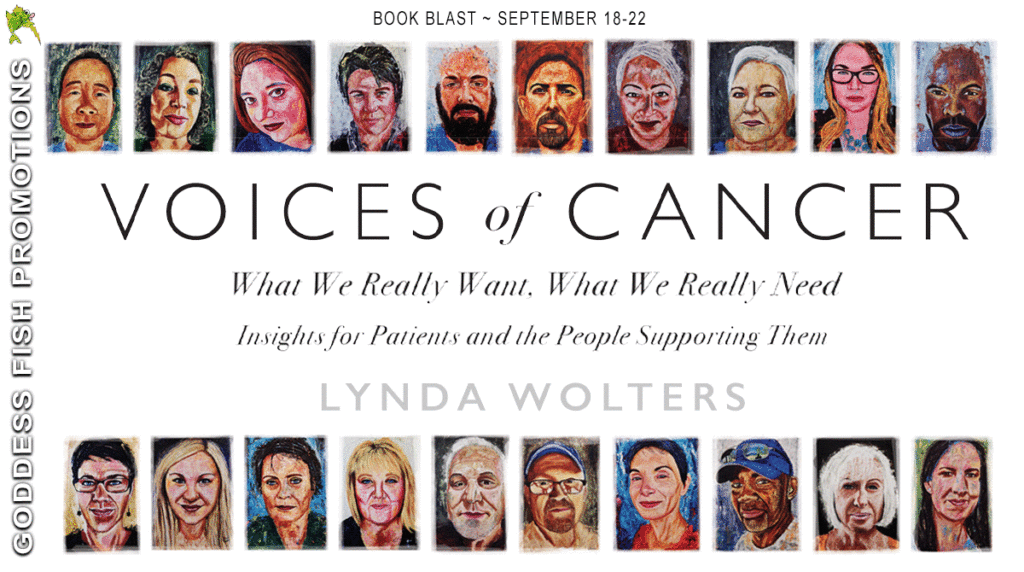
.
Welcome to my stop on the virtual book tour for Voices Of Cancer organized by Goddess Fish Promotions.
Author Lynda Wolters will be awarding a $25 Amazon or B&N Gift Card to a randomly drawn winner via rafflecopter during the tour. Don’t forget to enter!
And you can click on the tour banner to see the other stops on the tour.
Voices Of Cancer
by Lynda Wolters

Genre: Non-Fiction
Synopsis
“I don’t know what to say” and “I don’t know what to do” are common responses to a life-threatening diagnosis. Voices of Cancer is here to help.
Every cancer story is different, but there is one commonality: both patients and the people supporting them often struggle to properly articulate their wants and needs through particularly challenging and in many cases, uncharted territory. Lynda Wolters knows firsthand: she was diagnosed with stage 4 terminal mantle cell lymphoma in August of 2016.
Voices of Cancer offers a candid look into the world of a cancer patient, informed by Lynda’s own story and conversations had with dozens of patients weighing in on their needs, wants, and dislikes as they navigate the complex world of diagnosis, treatment, and beyond. With comprehensive and accessible insight from people who’ve been there, Voices of Cancer helps educate, dispel fears, and start positive conversations about what a cancer diagnosis truly means, while shining a light on how best to support a loved one on their own terms.
Check out this peek inside:
Tip 1: A good way to get involved is to find out when a patient is going to an appointment or having treatment and then be there for them. I do that with my cancer friends, and they are always genuinely happy to see me, even if I am only there to share a hug. It is surprising how a five-minute visit can carry a patient through an otherwise long, lonely day.
Tip 2: Setting up a meal delivery chain through mutual friends is a great way to be present and available to the patient and their family.
Tip 3: Checking to make sure the patient has adequate transportation to and from appointments is very useful because, most times, we patients either do not feel up to driving or are unable to drive after receiving treatment.
Tip 4: It is also helpful to have someone clean the house, even if that only means the bathroom and the kitchen. My husband did his best to do it all: work, cook, take care of me, clean. But, oh, what I would have given for a hand in this area, as I felt a lot of guilt by not being able to keep up my own house for a year.
Tip 5: Leading on from the previous tip, another way to provide support is to keep the patient’s caregiver in mind. That person has the weight of the world on their shoulders with all the added responsibilities. And don’t think the patient doesn’t realize this, which in turn adds unhealthy stress to the situation. The sense of guilt that comes with this can at times be overwhelming to the patient. Consider taking the caregiver out for a much-needed cup of coffee or meal, or perhaps sit with the patient so the caregiver can go for a solo walk or on an outing with friends. If the caregiver is running on empty, everyone feels it, so being present and available to the caregiver is a huge help to the patient. Whatever you do, we do love you for trying: anything is better than nothing. It is on the patient to educate friends and family as much as it is on the non-patient to be sensitive to the irritating little sayings that seem so harmless. Bottom line: most patients would prefer a well-meaning gesture, such as a meal or a visit, to an empty cliché that is better left on a T-shirt or a charity wristband.
About Author Lynda Wolters:
.

Lynda was born and raised in a tiny farming community of 400 in northern Idaho. She worked on the family farm, with her first job being picking rocks out of the fields and ultimately graduating up the ladder to driving a grain truck and combine during harvest. Following high school, Lynda continued her education in Las Vegas before she moved back home to Idaho to raise her three sons.
Lynda still resides in Idaho with her husband and their peekapoo, Max.
Lynda has worked in the legal field for 30+ years and enjoys ballroom and swing dancing, horseback riding, kayaking, and river rafting. She has a heart for people and enjoys regularly volunteering. She spends the bulk of her spare time reading and writing.
Lynda was diagnosed with terminal stage 4 Mantle Cell Lymphoma (MCL) in August 2016. She touts herself as being a thriving warrior of the disease.
Lynda has completed two books of nonfiction: Voices of Cancer, released in October 2019, and Voices of LGBTQ+, released in August 2020.
The Placeholder, Lynda’s debut novel, was released in November 2022.
Lynda has published the following articles: Navigating the Workplace with Chemo Brain, February 23, 2020, Elephants and Tea. and When Masks Weren’t Popular, March 24, 2020, Patient Power. She has spoken on several podcasts, been a guest on a local talk show regarding Voices of Cancer, and given interviews for other outlets and print.
Jane Brody wrote up Voices of Cancer in the New York Times, her article entitled What to Say to Someone with Cancer, on January 13, 2020, with a follow-up on January 20, 2020, entitled, When Life Throws You a Curveball, Embrace the New Normal.
The Chinese translation rights of Voices of Cancer have been purchased by a grant to offer the book to medical students in Tawain.
Lynda donates Voices of Cancer books and a portion of its proceeds to Epic Experience, a nonprofit camp for adult survivors and thrivers of cancer located in Colorado.
Author Links: Website / Facebook / Facebook Page / Instagram / Twitter
Amazon links: Kindle / Hard Copy / Audible
~~~~~

a Rafflecopter giveaway
~~~~~
Thanks so much for visiting fuonlyknew and Good Luck!
For a list of my reviews go HERE.
For a list of free eBooks updated daily go HERE
To see all of my giveaways go HERE.
























